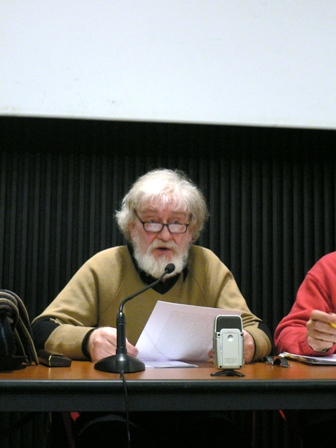This is the second of three posts about a recent visit with author Georges-Olivier Châteaureynaud, recently translated into English for the first time with A Life on Paper. In the last installment, I describe arriving at his house, and discuss his latest works. The evening conversation drifted toward literary chatter, which is where we pick up:
“How’s the new novel coming?â€
“I’ve written up a few synopses of ideas so far, to see which one I like best.â€
“You work from synopses?â€
“I didn’t always. I probably just put my head down and dived into Les Messagers,†he said, referring to his first novel from 1974, which won the Prix des Nouvelles Littéraires. Slim, dark, and elusively allegorical, it concerns an aimless young man who apprentices himself to a mysterious messenger forever seeking the intended recipient of the message he bears. It was reissued by Actes Sud in a revised version in 1997.
“Do you do them for yourself, or your publisher?â€
“Both. They’re usually around fifteen pages, though the one for L’Autre rive was sixty, and sold my editor on it. Of course, the story changed a lot after that.†The 650 page L’Autre rive [The Other Shore] recounts Bennett Riven’s search for his biological father against the complex sociological backdrop of Écorcheville, a city on the river Styx. The 2007 novel won the Grand Prix de l’Imaginaire at Utopiales, the science fiction and fantasy festival in Nantes. It is, by his own admission, the closest he’s come to magical realism—which may, he opines, be the way all novels of the fantastic incline.
“The basic pattern of the classical fantastical story—reality destabilized by a breach—lends itself to the short form,†said Châteaureynaud. “True novels of the fantastic are hard to pull off, and the successes few and far between, guiding our way like landmarks.â€
Uniting as it does settings and characters from his hundred-odd short stories, L’Autre rive has the feel of a statement or summation.
“There’s this holdover idea in French literature that one of a writer’s great tasks is creating a consistent, coherent world over the course of a body of work: Balzac, Zola,†said Châteaureynaud. “Critics look kindly on it.â€
“Is that what you were trying to do with L’Autre rive?â€
“Not consciously, no—that’s not what I set out to do,†he smiles. “But my world isn’t very coherent, either.â€
While characters and settings seem to recur throughout Châteaureynaud’s work, perhaps it is more accurate to say that the names have been intentionally re-used, though any given incarnation of a person or place may have only an oblique connection to the last, or the next. This lends continuity in his body of work a dreamlike quality, a sense of slippage.
“I have the great fortune of remembering my dreams,†Isak Dinesen once said. Châteaureynaud shares this blessing. » Read the rest of this entry «
